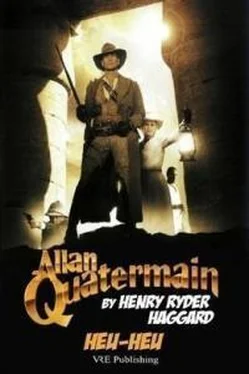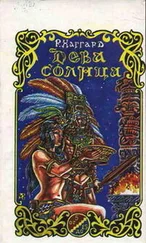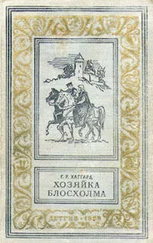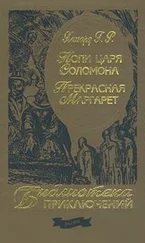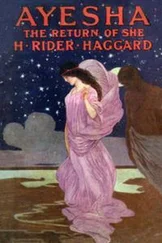I thought to myself that here Hans, although he did not know it, was enunciating one of the profoundest and most fundamental of truths, since those who bow the knee to Baal are Baal's servants and live under his law, even to the death, and what is Baal but Heu–Heu, or Satan? The fruit is always the same, by whatever name the tree may be called. However, I did not enter upon this argument with Hans, whom it would have bewildered, but only asked him what he meant and what he imagined was going to happen to Issicore. He answered,
"I mean just what I have said, Baas; I mean that Issicore is going to die. That old man told me that those who 'receive the Black Skull,' always die within the month, and often more quickly. From the look of him, I should think that Issicore will not last more than a week. Although so handsome, he is really very dull, Baas, so it does not much matter, especially as the Lady Sabeela will get over it quite soon. That is why Issicore has changed, Baas. It is because the fear of death is upon him. In the same way Sabeela has changed because the fear of death and what to her, perhaps, is worse, has passed away."
"Bosh!" I exclaimed, but internally I had my doubts. I knew something of this fetish business, although I believed it to be the greatest of rubbish, I was sure that it is extremely dangerous rubbish. The secret soul of man, especially of savage, or primitive and untaught man, or the sub–conscious self, or whatever you choose to call it, is a terrible entity when brought into action by the hereditary superstitions that are born in his blood. In nine cases out of ten, if the victim of those superstitions is told with the accustomed ceremonies by the oracle of the god or devil from which they flow, that he will die, he does die. Nothing kills him, but he commits a kind of moral suicide. As Hans had said—Fear makes him soft. Then some kind of nervous disease penetrates his system and at the appointed hour withers up his physical life and causes him to pass away.
Such, as it proved, was to be the fate of that Apollo–like person, the unhappy Issicore.
Chapter XV
Sabeela's Farewell
Now of this story there is little left to tell, and as it is very late and I see that you are all yawning, my friends [this was not true, for we were deeply interested, especially over the moral or spiritual problem of Issicore], I will cut that little as short as I can. It shall be a mere footnote.
After we had eaten that morning, we went to see Sabeela, whom we found very agitated. This was natural enough, considering all she had gone through, as after mental strain and the passing of great perils, a nervous reaction invariably follows. Also, in a sudden and terrible fashion, she had lost her father, to whom she was attached. But the real cause of her distress was different.
Issicore, it seemed, had been taken very ill. Nobody knew what was the matter with him, but Sabeela was persuaded that he had been poisoned. She begged me to visit him at once and cure him—a request that made me indignant. I explained to her that I was no authority on their native poisons, if he suffered from anything of the sort, and had few medicines with me, the only one of which that dealt with poisons was an antidote to snake bites. However, as she was very insistent, I said that I would go and see what I could do, which would probably be nothing.
So, together with Hans, I was conducted by some of the old headmen, or councillors of the Walloo, such people as in Zululand we should call Indunas , to the house of Issicore, a rather fine building of its sort at the other end of the town. We walked by the road that ran along the edge of the lake, which gave us an opportunity to observe the island, or rather what had been the island.
Now it was nothing but a low, dark mass, over which hung dense clouds of steam. When the winds stirred these clouds, I saw that beneath them were red streams of lava that ran into the lake. There were no more eruptions and the volcano appeared to have vanished away. Much dust was still falling. It lay thick upon the roadway and all the trees and other vegetation were covered with it, turning the landscape to a hue of ashen grey. Otherwise no damage had been done on the mainland, except that here and there boulders had fallen and some of the lower– lying fields were inundated by the great flood, which was now abating, although the river still overflowed its banks.
We reached the house of Issicore and were shown into his chamber, where he lay upon a couch of skins, attended by some women who, I understood, were his relatives. When Hans and I entered, these women bowed and went out, leaving us alone with the patient. A glance told me that he was a dying man. His fine eyes were fixed on vacancy; he breathed in gasps; his fingers clasped and unclasped themselves automatically, and from time to time he was taken with violent shiverings. These I thought must be due to some form of fever until I had tested his temperature with the thermometer I had in my little medicine case and found that it was two degrees below normal. On being questioned, he said that he had no pain and suffered only from great weakness and from a whirling of the head, by which I suppose meant giddiness.
I asked him to what he attributed his condition. He answered,
"To the curse of Heu–Heu, Lord Macumazahn. Heu–Heu is killing me."
I inquired why, for to argue about the folly of the business was futile, and he replied,
"For two reasons, Lord: first, because I left the land without his leave, and secondly, because I rowed you and the yellow man called Light–in–Darkness to the Holy Isle, to visit which unsummoned is the greatest of crimes. For this cause I must die more quickly than otherwise I should have done, but in any case my doom was certain, because I left the land to seek help for Sabeela. Here is the proof of it," and from somewhere about his person he produced the little black Death's Head which Hans had described to me. Then, without allowing me to touch the horrid thing, he hid it away again.
I tried to laugh him out of this idea, but he only smiled sadly and said,
"I know that you must have thought me a coward, Lord, because of the way I have borne myself since we reached this town of Walloo, but it was the curse of Heu–Heu working within me that changed my spirit. I pray you to explain this to Sabeela, whom I love, but who I think also believes me a coward, for yesterday I read it in her eyes. Now while I have still strength I would speak to you. First, I thank you and the yellow man, Light–in–Darkness, who by courage or by magic—I know not which—have saved Sabeela from Heu–Heu, and have destroyed his House and his priests and, I am told, his image. Heu–Heu, it is true, lives on since he cannot die, but henceforward here he is without a home or a shape or a worshipper, and therefore his power over the souls and bodies of men is gone, and among the Walloos, in time his worship will die out. Perhaps no more of my people will perish by the curse of Heu– Heu, Lord."
"But why should you die, Issicore?"
"Because the curse fell on me first, Lord, while Heu–Heu reigned over the Walloos, as he has done from the beginning, he who was once their earthly king."
I began to combat this nonsense, but he waved his hand in protest, and went on:
"Lord, my time is short and I would say something to you. Soon I shall be no more and forgotten, even by Sabeela, whose husband I had hoped to become. I pray, therefore, that you will marry Sabeela."
Here I gasped, but held my peace till he had finished.
"Already I have caused her to be informed that such is my last wish. Also I have caused all the elders of the Walloos to be informed, and at a meeting held this morning they decided that this marriage would be right and wise, and have sent a messenger to tell me to die as quickly as I can, in order that it may be arranged at once."
Читать дальше
